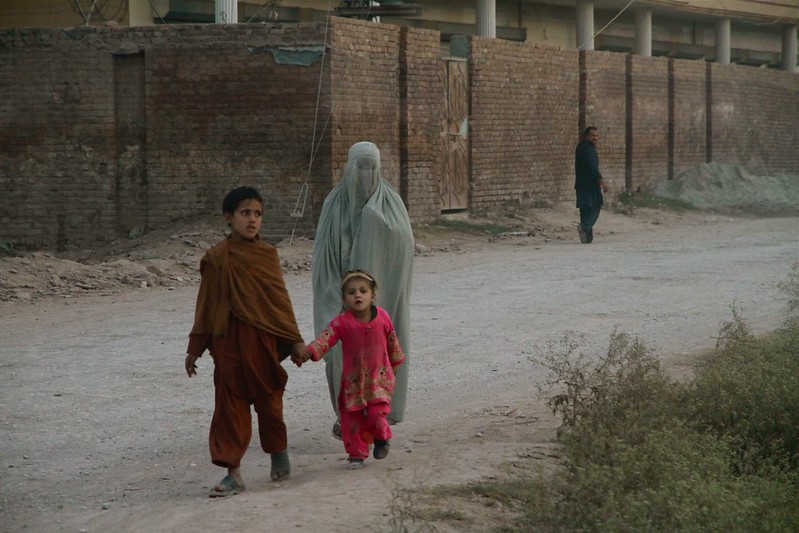Khilo aur Barho: Education Initiative in Pakistan
 The Khilo aur Barho initiative, translating to “Grow and Flourish,” aims to transform education for girls and out-of-school children in Pakistan. The British High Commission (BHC) launched this program as part of the Girls and Out of School Children: Action for Learning (GOAL) initiative. The initiative addresses educational access and quality in the provinces of Khyber Pakhtunkhwa (KP) and Punjab. Targeting children aged 5 to 16, this five-year program, which began in January 2023, strives to expand educational opportunities by enhancing the quality of teaching and learning outcomes. With a budget of up to £20 million, Khilo aur Barho aims to enroll at least 100,000 children in school. Additionally, the aim is to ensure that an additional 150,000 girls can read by the age of 10.
The Khilo aur Barho initiative, translating to “Grow and Flourish,” aims to transform education for girls and out-of-school children in Pakistan. The British High Commission (BHC) launched this program as part of the Girls and Out of School Children: Action for Learning (GOAL) initiative. The initiative addresses educational access and quality in the provinces of Khyber Pakhtunkhwa (KP) and Punjab. Targeting children aged 5 to 16, this five-year program, which began in January 2023, strives to expand educational opportunities by enhancing the quality of teaching and learning outcomes. With a budget of up to £20 million, Khilo aur Barho aims to enroll at least 100,000 children in school. Additionally, the aim is to ensure that an additional 150,000 girls can read by the age of 10.
British Foreign Aid Allocation
In the 2023/24 fiscal year, the Foreign, Commonwealth and Development Office (FCDO) allocated £41.54 million in official development aid (ODA) to Pakistan. Furthermore, current plans are to increase this amount to £133 million in 2024/25. The aid strategically focuses on education, support for women and girls, humanitarian efforts and climate change initiatives. Programs like GOAL have already had a positive impact on millions of children.
Educational Challenges in Pakistan
Despite some progress in recent years, Pakistan’s education system still faces significant challenges. Both government and private schools struggle to provide quality education. A nongovernmental organization focused on women’s rights in Punjab attributes the state’s historic neglect of education to insufficient resource allocation and lack of budget prioritization. This situation highlights widespread governance failures that compromise educational standards and perpetuate public distrust in the system. Reports indicate problems such as absentee teachers, bribery for teaching positions and inadequate government oversight in private schools, all of which further exacerbate the educational crisis.
The COVID-19 pandemic has exacerbated educational challenges, resulting in 26.2 million children out of school by 2024. Girls face disproportionate effects, with only 64% in Punjab and 54% in KP ever attending school. Systemic deficiencies and socio-cultural barriers compound these ongoing challenges, as families in impoverished areas often prioritize boys’ education due to financial constraints and traditional gender roles. High education costs, including fees and related expenses, frequently push girls into labor or early marriage.
Strategies for Educational Reform
Khilo aur Barho’s approach to improve educational outcomes:
- Foundational Learning. The program employs accelerated and alternative learning programs (ALPs) providing access to education for marginalized, over-age and out-of-school children, enabling them to enrol in mainstream schools or gain educational certification.
- Reading and Maths Skills. Direct interventions aim to enhance literacy and numeracy among children, with monitoring and evaluation mechanisms in place to measure progress.
- School Safety and Inclusivity. Efforts to promote school safety and inclusivity involve sensitizing school administrations, parent-teacher councils, teachers and students to safeguarding principles and addressing issues such as violence, bullying and corporal punishment. Training initiatives for school stakeholders aim to foster a culture f safety and tolerance, utilizing positive storytelling, media interventions and inclusive pedagogy to cultivate empathy and build tolerance across communities.
- Community and Parental Engagement. Engaging communities and parents is crucial for boosting enrolment and retention rates. This includes addressing home and environmental factors that impact learning, such as lead poisoning. By involving communities in educational initiatives, Khilo aur Barho ensures that children are supported academically, emotionally and socially. This approach aims for the program’s sustainability beyond its initial funding period.
- Support for Marginalised Groups. The program targets marginalized children, including those with disabilities, religious minorities and girls. They provide specialized support to ensure their inclusion in the education system.
Looking Ahead
The Khilo aur Barho initiative is making strides toward addressing educational disparities in Pakistan. With the goal of enrolling 100,000 children in school and ensuring that 150,000 girls can read by age 10, this program focuses on improving access to education in Khyber Pakhtunkhwa and Punjab. By targeting marginalized groups and enhancing teaching quality, the initiative aims to create lasting change in the educational landscape of Pakistan.
– Georgia O’Keeffe
Georgia is based in Wiltshire, UK and focuses on Technology and Politics for The Borgen Project.
Photo: Flickr
